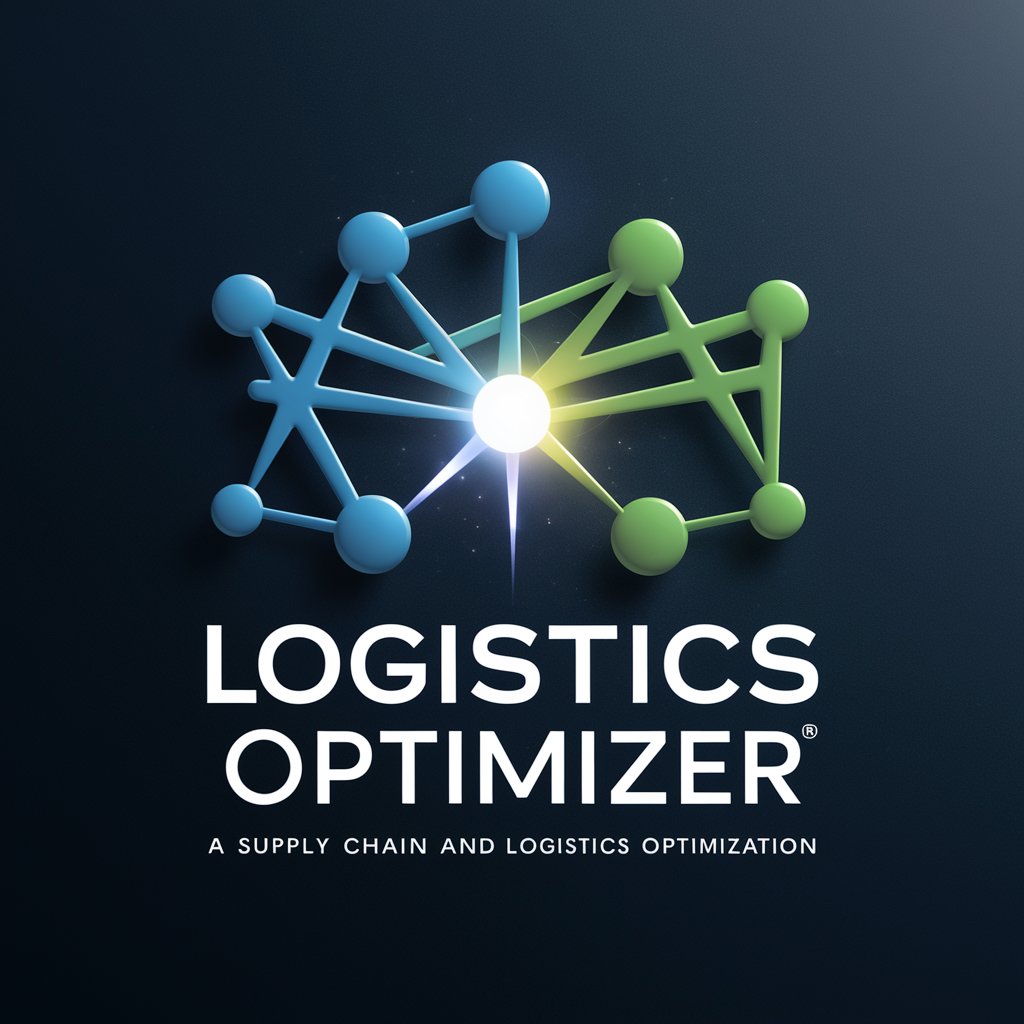"Logistics Optimizer - Supply Chain AI Solutions

Welcome to Logistics Optimizer, your partner in supply chain efficiency.
Optimizing logistics with AI power
Optimize inventory levels to reduce excess stock and prevent shortages by...
Enhance transportation management by implementing...
Develop a comprehensive supply chain strategy that focuses on...
Improve operational efficiency by analyzing and adjusting...
Get Embed Code
Introduction to Logistics Optimizer
Logistics Optimizer is a specialized AI tool designed to enhance efficiency within supply chain and logistics operations. It's engineered to manage, analyze, and optimize various aspects of logistics, from inventory management to transportation and distribution strategies. The core purpose of Logistics Optimizer is to assist businesses in reducing operational costs, improving delivery times, and increasing overall service quality. For example, it can simulate and predict outcomes of different logistics strategies, allowing companies to make informed decisions without the trial-and-error process. Scenarios like optimizing the route for a delivery fleet to minimize fuel consumption and delivery times, or adjusting inventory levels based on predictive analytics to meet demand without overstocking, illustrate its capabilities. Powered by ChatGPT-4o。

Main Functions of Logistics Optimizer
Supply Chain Planning
Example
Determining the most efficient way to source materials, produce goods, and distribute them to the end customer.
Scenario
A manufacturer uses Logistics Optimizer to analyze supplier performance, lead times, and cost implications to create a robust supply chain strategy that ensures timely delivery and minimizes costs.
Inventory Optimization
Example
Balancing stock levels to meet demand without excessive overstock.
Scenario
A retailer employs Logistics Optimizer to dynamically adjust inventory levels across multiple locations based on sales forecasts, seasonal trends, and current demand, significantly reducing holding costs and improving stock turnover.
Transportation Management
Example
Streamlining the process of shipping goods from origin to destination in the most efficient manner.
Scenario
A logistics company uses Logistics Optimizer to select the best carriers, consolidate shipments for cost savings, and plan the most efficient routes, reducing transportation costs and improving delivery times.
Operational Efficiency Analysis
Example
Evaluating and improving the efficiency of logistics operations.
Scenario
A distribution center applies Logistics Optimizer to assess warehouse operations, identifying bottlenecks in the picking and packing process and recommending layout changes and automation technologies to enhance throughput and reduce errors.
Ideal Users of Logistics Optimizer Services
Manufacturers
Manufacturers benefit by integrating supply chain planning and inventory optimization to reduce production lead times and costs, ensuring they can meet customer demands efficiently.
Retailers
Retailers leverage it for inventory management and distribution logistics, optimizing stock levels across stores and distribution centers to improve product availability and customer satisfaction.
Logistics and Transportation Companies
These companies use Logistics Optimizer to manage transportation operations, optimize routes, and reduce fuel costs, which is crucial for maintaining competitive pricing and service levels.
Supply Chain Consultants
Consultants utilize Logistics Optimizer as a tool to provide data-driven insights and strategies to their clients, helping them solve complex supply chain challenges and improve their operational efficiencies.

How to Use Logistics Optimizer
Start with a Free Trial
Begin by accessing yeschat.ai to start your free trial without the need for signing up or having ChatGPT Plus.
Define Your Logistics Needs
Identify and specify your logistics and supply chain challenges or objectives to tailor the tool's capabilities to your requirements.
Input Your Data
Enter data related to your logistics operations, including inventory levels, shipping details, and supply chain metrics, ensuring accuracy for optimal recommendations.
Utilize Optimization Features
Leverage the tool's optimization features for transportation management, inventory optimization, and route planning to enhance operational efficiency.
Review and Implement Recommendations
Evaluate the tool's recommendations, then apply the suggested strategies and solutions to your logistics operations for improved results.
Try other advanced and practical GPTs
AI Insight Explorer
Unlock AI insights with advanced analysis

Affordable Housing Advisor
Empowering Housing Choices with AI

Interview Jeff Wilson 💬
Insightful Career Guidance Powered by AI

Natural Beauty and Rejuvenation
Empowering beauty and wellness with AI

Accounting Sales Assistant at Incorporate Inc.
Streamlining Your Accounting with AI

Wellness at Work
Empowering Your Wellness Journey with AI

Accessibility Ally
Empowering digital accessibility with AI

QA & Testing
Empower development with AI-driven QA

CRO Analyst
Optimizing Conversions with AI Insight

Escritório Virtual de Direito Previdenciário
Navigating Brazilian Social Security with AI-Powered Expertise

GQR
Empowering content with AI-driven insights

SEO en Hypnose Specialist NL-BE
Empowering Your Digital Presence with AI

FAQs about Logistics Optimizer
What is Logistics Optimizer?
Logistics Optimizer is an AI-powered tool designed to enhance supply chain and logistics operations by providing customized solutions for inventory management, route optimization, and overall efficiency improvement.
How can Logistics Optimizer improve my supply chain?
It analyzes your specific logistics data to identify inefficiencies and provides actionable recommendations for inventory levels, transportation routes, and scheduling to streamline operations and reduce costs.
Is Logistics Optimizer suitable for all types of businesses?
Yes, Logistics Optimizer is adaptable to businesses of all sizes and sectors, offering scalable solutions for complex supply chain and logistics challenges.
How does Logistics Optimizer integrate with existing systems?
It can seamlessly integrate with most ERP and supply chain management systems, facilitating the exchange of data for real-time analysis and optimization.
What kind of support does Logistics Optimizer offer?
Users have access to comprehensive support, including tutorials, user guides, and customer service, ensuring you maximize the tool's benefits for your logistics operations.
